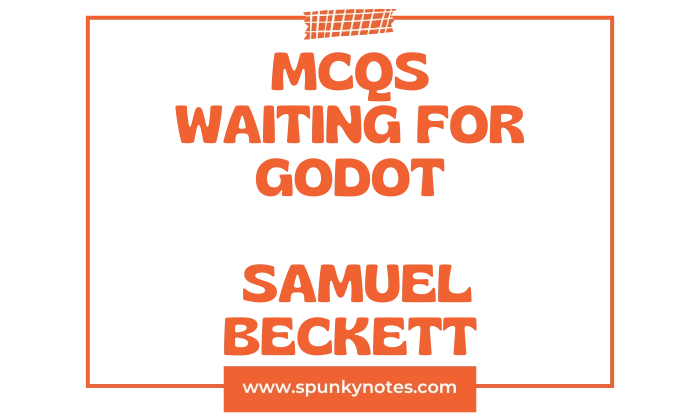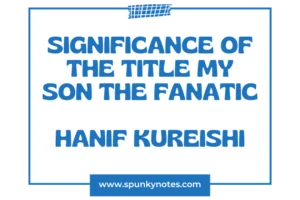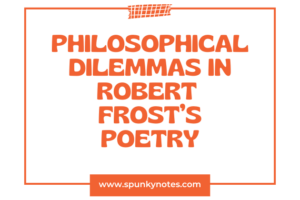

Estimated Reading Time: 17 min
Waiting for Godot MCQs
1. What is the genre of Waiting for Godot as stated in the text?
A. A comedy
B. A tragedy
C. A tragicomedy
D. A drama
2. Which character is introduced first in Act I, trying to remove his boot?
A. Vladimir
B. Lucky
C. Pozzo
D. Estragon
3. What is Estragon doing at the very beginning of Act I?
A. Singing a song
B. Trying to take off his boot
C. Talking to Vladimir
D. Eating a carrot
4. What is Vladimir’s initial reaction to Estragon’s “Nothing to be done”?
A. He disagrees vehemently.
B. He’s beginning to come round to that opinion.
C. He suggests trying something new.
D. He laughs loudly.
5. Where did Estragon spend the night before the play begins?
A. In a luxurious hotel
B. In a ditch
C. Under the tree
D. With Pozzo
6. Vladimir believes that but for him, Estragon would be what at the present minute?
A. A rich man
B. A little heap of bones
C. Far away from him
D. Happy
7. Vladimir quotes a saying, “Hope deferred maketh the something sick.” What word is he searching for?
A. Heart
B. Soul
C. Mind
D. Body
8. What action does Vladimir repeatedly perform with his hat?
A. He throws it in the air.
B. He puts it on and takes it off, peering and feeling inside.
C. He uses it to shield his eyes.
D. He polishes it.
9. What biblical story does Vladimir recall to Estragon to pass the time?
A. The creation of the world
B. Noah’s Ark
C. The two thieves crucified with the Saviour
D. The story of Adam and Eve
10. Why do Vladimir and Estragon remain in the “charming spot”?
A. They are waiting for the boy.
B. They are waiting for Pozzo.
C. They are waiting for Godot.
D. They are too tired to move.
11. How does the tree appear at the end of Act I?
A. Full of green leaves
B. Blooming with flowers
C. Dead or without leaves
D. Covered in fruit
12. What day of the week does Godot mention he might come?
A. Sunday
B. Monday
C. Saturday
D. Friday
13. What does Vladimir refuse to let Estragon tell him about?
A. His past life
B. His dreams
C. His feelings
D. His plans
14. Estragon suggests that it might be better for them to do what?
A. Find food
B. Part ways
C. Go to sleep
D. Tell jokes
15. What action do Vladimir and Estragon consider to pass the time?
A. Playing a game
B. Telling stories
C. Hanging themselves
D. Going for a walk
16. What does Estragon suggest they do instead of hanging themselves?
A. Don’t let’s do anything. It’s safer.
B. Let’s go look for food.
C. Let’s continue waiting for Godot.
D. Let’s try and sleep.
17. What did Vladimir and Estragon ask Godot for?
A. Money
B. Nothing very definite, a kind of prayer, a vague supplication.
C. Food and shelter.
D. A place to sleep.
18. What food item does Vladimir initially offer Estragon, which turns out to be something else?
A. A potato, but it’s a radish.
B. A turnip, but it’s a carrot.
C. A carrot, but it’s a turnip.
D. An apple, but it’s a pear.
19. After eating the carrot, Estragon remembers his question. What was it?
A. “Where are we?”
B. “Are we tied?”
C. “What time is it?”
D. “Is Godot coming?”
20. What frightens Vladimir and Estragon, signaling the entrance of Pozzo and Lucky?
A. A terrible cry
B. A bright light
C. A loud bell
D. A sudden silence
21. How is Lucky being driven by Pozzo when they first appear?
A. By a leash around his waist.
B. By a rope passed around his neck.
C. By a stick.
D. By verbal commands only.
22. What item does Lucky carry upon his first entrance?
A. A small suitcase and a book.
B. A heavy bag, a folding stool, a picnic basket, and a greatcoat.
C. Only a heavy bag.
D. A whip and a hat.
23. What name do Estragon and Vladimir initially mistake Pozzo for?
A. Bozzo
B. Gozzo
C. Godot
D. Adam
24. What does Pozzo take out of his picnic basket to eat and drink?
A. Bread and water
B. Cheese and beer
C. Chicken and wine
D. Fish and tea
25. After Pozzo finishes eating, what does Estragon timidly ask for?
A. A drink of water
B. The chicken bones
C. Directions to a town
D. Money
26. What does Pozzo admit he wants to do with Lucky?
A. Give him a raise.
B. Sell him at the fair.
C. Set him free.
D. Make him his equal.
27. What happens when Estragon attempts to wipe Lucky’s tears with a handkerchief?
A. Lucky thanks him.
B. Lucky cries more.
C. Lucky kicks him violently in the shins.
D. Lucky embraces him.
28. What does Pozzo say about “The tears of the world” and “the laugh”?
A. They are infinite.
B. They are a constant quantity.
C. They are decreasing.
D. They are increasing.
29. What kind of hat do all four characters (Vladimir, Estragon, Pozzo, Lucky) wear?
A. Top hats
B. Bowlers
C. Fedoras
D. Berets
30. What object is essential for Lucky to be able to think?
A. His rope
B. His hat
C. His bags
D. His stool
31. What happens when Vladimir removes Lucky’s hat?
A. He sings a beautiful song.
B. He falls silent and falls.
C. He starts to dance wildly.
D. He immediately tries to retrieve it.
32. What do Vladimir and Estragon say to pass the time after Pozzo and Lucky exit?
A. “That passed the time.”
B. “We must leave now.”
C. “Let’s sing.”
D. “I’m hungry.”
33. What message does the Boy deliver from Mr. Godot?
A. Godot is coming this evening.
B. Godot won’t come this evening but surely tomorrow.
C. Godot has decided not to come at all.
D. Godot is ill and cannot come.
34. Who does the Boy say Godot beats?
A. The goats
B. His brother
C. The sheep
D. Nobody
35. What message does Vladimir tell the Boy to deliver to Mr. Godot?
A. That they are still waiting.
B. That they are leaving.
C. That he saw them.
D. That they are angry.
36. What do Vladimir and Estragon agree to bring with them tomorrow, if Godot doesn’t come?
A. Food
B. More clothes
C. A bit of rope
D. Tools
37. What is the final action of Vladimir and Estragon at the end of Act I?
A. They leave the stage.
B. They sit down.
C. They embrace.
D. They do not move.
38. At the start of Act II, what is noticeably different about the tree?
A. It has been cut down
B. It is much larger
C. It has four or five leaves
D. It has a rope hanging from it
39. What is the subject of the song Vladimir sings to himself at the start of Act II?
A. A story of two friends
B. A dog in a kitchen
C. A man waiting by a road
D. The rising of the moon
40. What is Estragon’s first reaction upon seeing the boots again in Act II?
A. They’re not mine.
B. I’m glad someone left them.
C. They’re even worse than before.
D. Finally, my boots!
41. During the hat-swapping scene, which three hats are passed between Vladimir and Estragon?
A. Vladimir’s, Estragon’s, and the boy’s
B. Vladimir’s, Estragon’s, and Pozzo’s
C. Vladimir’s, Estragon’s, and Lucky’s
D. Two of their own and a new one
42. How has Pozzo’s physical condition changed upon his return in Act II?
A. He is láme
B. He is deaf
C. He is blind
D. He has lost an arm
43. What does Pozzo say the blind have no notion of?
A. Color
B. Beauty
C. Time
D. Direction
44. What does Pozzo say is in the heavy bag that Lucky carries?
A. Stones
B. His belongings
C. Food
D. Sand
45. What new affliction does Lucky have in Act II?
A. He is blind
B. He is láme
C. He is deaf
D. He is dúmb
46. In his final, angry speech, Pozzo exclaims, “They give birth astride of a grave…” What comes next?
A. “…the light gleams an instant, then it’s night once more.”
B. “…we live a moment, then we are gone.”
C. “…we cry for a while, then silence falls.”
D. “…the pain is short, but the darkness is long.”
47. When the boy arrives in Act II, does he claim to be the same boy from the previous day?
A. Yes
B. No
C. He doesn’t remember
D. He refuses to answer
48. In his monologue after the boy leaves, Vladimir says what is a “great deadener”?
A. Waiting
B. Suffering
C. Habit
D. Silence
49. What does Estragon propose they use to hang themselves at the end of the play?
A. A bit of rope
B. His belt
C. Vladimir’s coat
D. A vine from the tree
50. What is the final action of Vladimir and Estragon at the end of Act I?
A. They leave the stage.
B. They sit down.
C. They embrace.
D. They do not move.
Brief Overview
Waiting for Godot is a two-act play by Samuel Beckett. It is a cornerstone of the Theatre of the Absurd. The play is about two tramps, Estragon (Gogo) and Vladimir (Didi), who wait endlessly by a barren tree for the arrival of a mysterious figure named Godot.
The entire play consists of the two men talking, arguing, and performing small, repetitive actions to pass the time. They are unable to leave because they are waiting for Godot, though they are unsure who he is, why they are waiting, or if he will ever come. They rely completely on each other to face the crushing emptiness of their existence.
In both Act I and Act II, two other characters appear. Pozzo is a cruel, pompous master, and Lucky is his silent, suffering slave, whom he leads by a rope. Their relationship is a harsh satire of dependency and power. Lucky performs a famous, rambling “think” monologue before being silenced again.
In each act, a Boy arrives as a messenger from Godot. The Boy always tells Estragon and Vladimir that Godot will not come today, but will surely come tomorrow. The tramps consider leaving after this news, but they always remain frozen in place.
The second act repeats the pattern of the first, but the characters are more degraded. Pozzo is now blind, and Lucky is mute. The tramps’ memories are unreliable, and the tree has grown a few leaves. The play ends just as it began: Estragon and Vladimir say they will leave, but they do not move.


